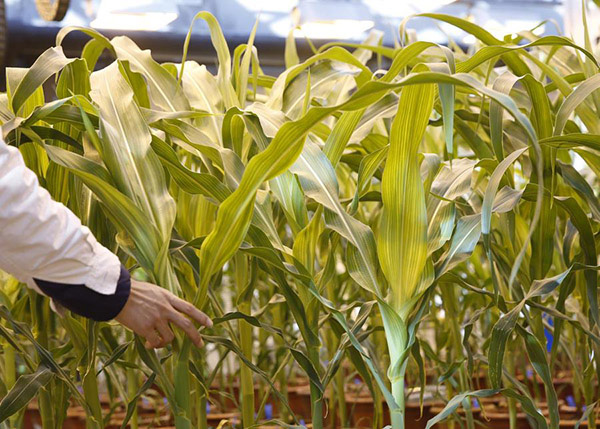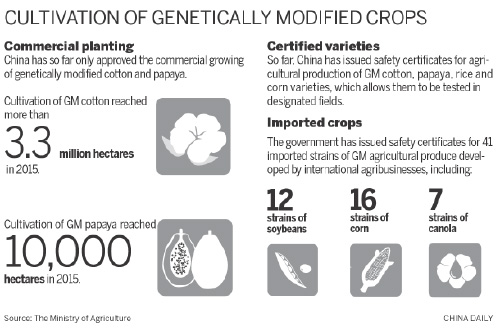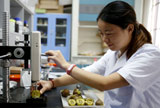GM seeds to get oversight
By XU WEI (China Daily) Updated: 2016-04-14 07:07
A researcher checks on corn plants in a green house cultivating natural corn and genetically modified corn in Syngenta Biotech Center in Beijing, Feb 19, 2016. [Photo/Agencies]

Nation will continue to develop varieties resistant to disease, drought and pests
China will further step up its oversight of the seed market to prevent illegal commercial cultivation of unauthorized genetically modified varieties, an agricultural official said on Wednesday, after several cases of illegal cultivation were investigated by authorities last year.
However, Liao Xiyuan, head of the Department of Science, Technology and Education under the Ministry of Agriculture, told a news conference on Wednesday that the country could push forward the commercial cultivation of pest-resistant GM corn varieties in the next five years.
Liao said the country will increase oversight of GM crops in research and development, registration and production phases to prevent unapproved varieties from flowing into the markets.
The authority will also focus on key agricultural seasons and increase oversight of companies and sales outlets, especially in rural areas.
Liao said authorities in Liaoning province recently investigated three cases of illegal cultivation of GM corn, which coincided with a report by Greenpeace in January that claimed farmers were illegally growing GM corn.
In 2015, authorities destroyed more than 66 hectares of corn-seed farms in the Xinjiang Uygur autonomous region and Gansu province. In Hainan province, authorities destroyed more than 6 hectares of GM corn farms.
Liao signaled at the conference that in the next five years a GM corn variety could become the first approved GM staple food in the country. However, China does allow imports of GM soybeans, corn and canola, a majority of which are used for oil and animal feed.
Liao said the country will push forward industry strategies that emphasize commercial crops and crops that serve as industrial raw materials during the 13th Five-Year Plan (2016-20) period.
New varieties of pest resistant, genetically modified cotton and corn will be the key products to be promoted for commercial cultivation, he said.
Liao said the promotion of GM technology will follow a three-step approval procedure from nonedible crops, such as cotton, to indirectly edible crops that serve as animal feed and industrial materials to edible crops.
"The approval of GM staple foods will come in the last step," he said, adding that the country will prioritize the development of GM varieties that are resistant to disease, pests and drought.
Wu Kongming, chairman of the nation's biosafety committee in charge of agricultural GM organisms, said China has a strict approval and evaluation process, yet the country's anti-GMO sentiment has been fueled by widespread rumors on social media.
He gave the example of the two varieties of GM rice being developed in China, which have already undergone 11 years of safety evaluation by researchers.
"Only by clearing the rumors can we provide a good environment for the country's GMO technology," he said.

- China eyes cultivation of pest resistant GM corn
- Ministry vows greater oversight to prevent sale of unauthorized GM seeds
- Government vows to step up supervision of GM crops
- GM to focus on SUVs and MPVs for growth
- Soybean province wants protection from GM crops
- Cases of illegal GM crops 'under control'
- Former convicts coming in from the cold
- Fraud fugitive on most wanted list has been arrested
- Beijing's tobacco control efforts now bearing fruit
- Strong tremors felt in Tibet after Myanmar quake
- Li: Central govt to decide local share of new tax
- Xi says protecting relics a priority
- Xinhua Dictionary sets two Guinness World Records
- Shenzhen to set specified rules for express vehicles
- Shared business flights are under way
- G7 'should avoid being hijacked'








